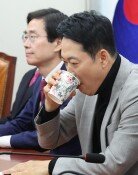Growth-oriented Welfare System
Growth-oriented Welfare System
Posted October. 07, 2010 02:26,
British Welfare Minister Iain Duncan Smith announced Saturday a plan for wholesale welfare reform to help those dependent on government subsidies to stand on their own two feet within 10 years. If those eligible for welfare are able to work, they have to do so to get benefits. This is to rectify the loose welfare system that has resulted in a fourth of economically active adults in the U.K. to remain idle. British Prime Minister David Cameron said he will help his people lift themselves out of poverty by making them feel that working is much better than living on welfare.
Britains revolutionary welfare reform shows a paradigm shift in welfare systems in advanced economies. The big trend in European welfare states is the transition from welfare to workfare, which links benefits to employment. France, Belgium, Luxembourg, the Netherlands and Germany, all of whose welfare systems were recently explored by The Dong-A Ilbo in a three-part series, have adopted a system of social investment welfare that aims to simultaneously achieve economic growth and social integration. Dutch welfare recipients must get vocational training to receive benefits unless they are unable to work. The German government integrated unemployment benefits into those for basic livelihood in 2003 to reduce the number of people who stay jobless for a long time seeking to receive unemployment benefits. The five countries approach welfare from the perspective of investment in human resources. In Korea, however, economic growth is still at odds with social welfare.
The government increased the welfare budget for next year to 86.3 trillion won (76.5 billion U.S. dollars), up 5.1 trillion won (4.52 billion dollars) from this years figure and accounting for a record 27.9 percent of the national budget. Seoul must help a warm market economy take root by caring for the socially marginalized. Expansion of the social safety net is urgently needed to prevent part-time workers and the self-employed from falling into poverty due to unemployment, disease or natural disasters. The number of workers not covered by unemployment insurance is 13 million, or 59 percent of the nation`s workforce. So the government must extend a helping hand to those who need help the most.
The national welfare system focuses solely on distribution and undermines growth potential, however, and this needs to be changed. The system creates moral hazard among beneficiaries and increases the burden on taxpayers, shaking the basis of the economy. To establish a growth-oriented welfare paradigm for the 21st century, a drastic shift is necessary to put more emphasis on recipients. The Health and Welfare Ministry began operating an integrated social welfare management system this year that integrated data on the qualifications of welfare recipients and their backgrounds. Yet little has changed for recipients. People are not satisfied with the welfare system because of inefficient distribution and lack of employment support.
A Board of Audit and Inspection survey on welfare funds conducted for the years 2005 to 2008 found that 287.9 billion won (255 million dollars) of the money was wasted. The government must cooperate with the private sector to introduce the principles of competition, effectiveness and responsibility to welfare. To realize workfare, structural reform to merge a government agency in charge of welfare with that of employment supervision should also be considered. Korea must learn a clear lesson from the European financial crisis, which was caused by excessive welfare spending and fiscal deficits, and seek a 21st-century welfare system.







